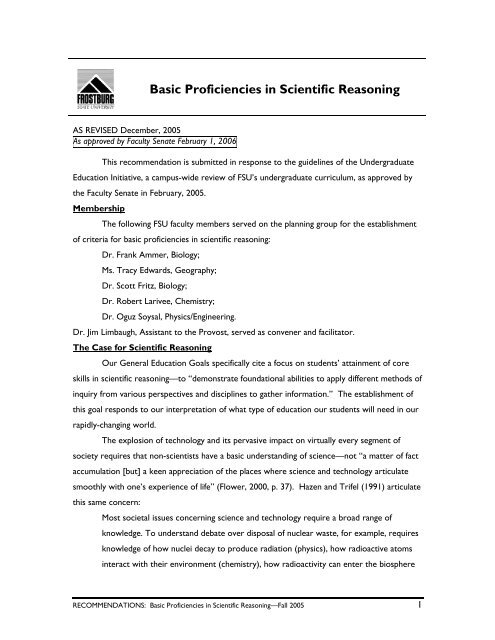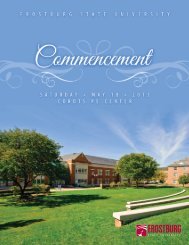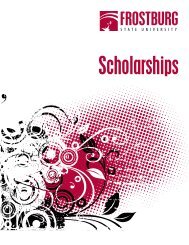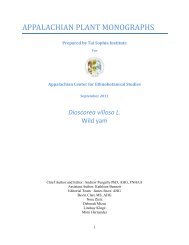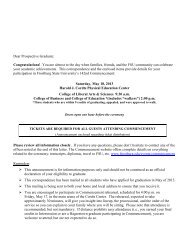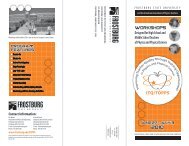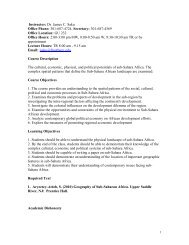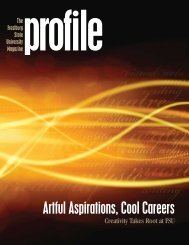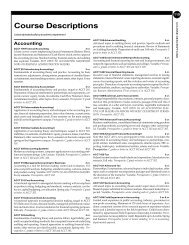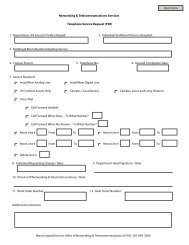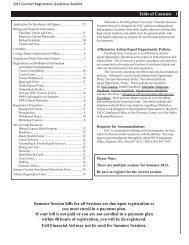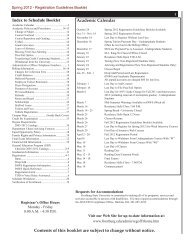Basic Proficiencies in Scientific Reasoning - Frostburg State University
Basic Proficiencies in Scientific Reasoning - Frostburg State University
Basic Proficiencies in Scientific Reasoning - Frostburg State University
Create successful ePaper yourself
Turn your PDF publications into a flip-book with our unique Google optimized e-Paper software.
<strong>Basic</strong> <strong>Proficiencies</strong> <strong>in</strong> <strong>Scientific</strong> Reason<strong>in</strong>g<br />
AS REVISED December, 2005<br />
As approved by Faculty Senate February 1, 2006<br />
This recommendation is submitted <strong>in</strong> response to the guidel<strong>in</strong>es of the Undergraduate<br />
Education Initiative, a campus-wide review of FSU’s undergraduate curriculum, as approved by<br />
the Faculty Senate <strong>in</strong> February, 2005.<br />
Membership<br />
The follow<strong>in</strong>g FSU faculty members served on the plann<strong>in</strong>g group for the establishment<br />
of criteria for basic proficiencies <strong>in</strong> scientific reason<strong>in</strong>g:<br />
Dr. Frank Ammer, Biology;<br />
Ms. Tracy Edwards, Geography;<br />
Dr. Scott Fritz, Biology;<br />
Dr. Robert Larivee, Chemistry;<br />
Dr. Oguz Soysal, Physics/Eng<strong>in</strong>eer<strong>in</strong>g.<br />
Dr. Jim Limbaugh, Assistant to the Provost, served as convener and facilitator.<br />
The Case for <strong>Scientific</strong> Reason<strong>in</strong>g<br />
Our General Education Goals specifically cite a focus on students’ atta<strong>in</strong>ment of core<br />
skills <strong>in</strong> scientific reason<strong>in</strong>g—to “demonstrate foundational abilities to apply different methods of<br />
<strong>in</strong>quiry from various perspectives and discipl<strong>in</strong>es to gather <strong>in</strong>formation.” The establishment of<br />
this goal responds to our <strong>in</strong>terpretation of what type of education our students will need <strong>in</strong> our<br />
rapidly-chang<strong>in</strong>g world.<br />
The explosion of technology and its pervasive impact on virtually every segment of<br />
society requires that non-scientists have a basic understand<strong>in</strong>g of science—not “a matter of fact<br />
accumulation [but] a keen appreciation of the places where science and technology articulate<br />
smoothly with one’s experience of life” (Flower, 2000, p. 37). Hazen and Trifel (1991) articulate<br />
this same concern:<br />
Most societal issues concern<strong>in</strong>g science and technology require a broad range of<br />
knowledge. To understand debate over disposal of nuclear waste, for example, requires<br />
knowledge of how nuclei decay to produce radiation (physics), how radioactive atoms<br />
<strong>in</strong>teract with their environment (chemistry), how radioactivity can enter the biosphere<br />
RECOMMENDATIONS: <strong>Basic</strong> <strong>Proficiencies</strong> <strong>in</strong> <strong>Scientific</strong> Reason<strong>in</strong>g—Fall 2005 1
(earth science), and how it will affect liv<strong>in</strong>g th<strong>in</strong>gs (biology.) Other issues, such as global<br />
warm<strong>in</strong>g, space research, and alternative energy sources likewise depend on a spectrum<br />
of scientific concepts, although clearly more than science is <strong>in</strong>volved. (p. 64)<br />
In many respects, a science-literate <strong>in</strong>dividual “needs to understand a little bit of several<br />
discipl<strong>in</strong>es” (Hazen and Trifel, 1991, p. 64), a premise supported by Flower (2000):<br />
A science-literate <strong>in</strong>dividual possesses a basic vocabulary of scientific concepts and<br />
terms, knowledge of the processes of science utilized to test our models for mak<strong>in</strong>g<br />
sense of the world, and an appreciation of the effect of science and technology on<br />
society, to a degree sufficient to participate <strong>in</strong> deal<strong>in</strong>g with the <strong>in</strong>creas<strong>in</strong>gly large number<br />
of science- and technology-laden public policy questions we face. (p. 38).<br />
Hobson (2000) offers a view that, while almost alarmist <strong>in</strong> nature, still underscores the<br />
importance of scientific literacy: “Industrial society cannot survive unless citizens are literate<br />
about science-related societal issues” (p. 240). Even the American Association for the<br />
Advancement of Science issues a similar warn<strong>in</strong>g, express<strong>in</strong>g its view that <strong>in</strong> the 21st century a<br />
basic understand<strong>in</strong>g of scientific pr<strong>in</strong>ciples should be considered as important as a liberal arts<br />
education (Wallace, 2000) and express<strong>in</strong>g the concern that our national lack of knowledge about<br />
the sciences “may also be hazardous to our national security” because of the possibility for<br />
error <strong>in</strong> mak<strong>in</strong>g science-related policy decisions.<br />
Because we have a responsibility as an <strong>in</strong>stitution of higher learn<strong>in</strong>g to develop scienceliterate<br />
<strong>in</strong>dividuals, the <strong>University</strong> will use the def<strong>in</strong>ition of scientific reason<strong>in</strong>g, as outl<strong>in</strong>ed <strong>in</strong> a<br />
follow<strong>in</strong>g section, to help students develop skills <strong>in</strong> scientific reason<strong>in</strong>g and to guide assessments<br />
of student learn<strong>in</strong>g outcomes.<br />
External Mandates<br />
The development and assessment of core skills <strong>in</strong> general education also responds to<br />
the requirements of two external entities: The Maryland Higher Education Commission and the<br />
Middle <strong>State</strong>s Association of Higher Education.<br />
The Maryland Higher Education Commission has mandated that all Maryland <strong>in</strong>stitutions<br />
of higher education establish specific def<strong>in</strong>itions and benchmarks regard<strong>in</strong>g college-level skills <strong>in</strong><br />
seven basic skills. In addition to scientific reason<strong>in</strong>g, these skills <strong>in</strong>clude written communication,<br />
critical th<strong>in</strong>k<strong>in</strong>g, quantitative reason<strong>in</strong>g, oral communication, technological literacy, and<br />
<strong>in</strong>formation literacy. Said benchmarks are to be assessed on a regular basis and reported to<br />
MHEC every three years, beg<strong>in</strong>n<strong>in</strong>g <strong>in</strong> 2007.<br />
The <strong>University</strong>’s accredit<strong>in</strong>g agency, the Middle <strong>State</strong>s Association of Higher Education,<br />
<strong>in</strong> its revised standards, also specifically mentions the need to assess students’ skills <strong>in</strong> scientific<br />
RECOMMENDATIONS: <strong>Basic</strong> <strong>Proficiencies</strong> <strong>in</strong> <strong>Scientific</strong> Reason<strong>in</strong>g—Fall 2005 2
eason<strong>in</strong>g. The accreditation standards of the Middle <strong>State</strong>s Commission on Higher Education<br />
state that an <strong>in</strong>stitution’s program of general education must be designed “so that students<br />
acquire and demonstrate college-level proficiency <strong>in</strong> general education and essential skills”<br />
<strong>in</strong>clud<strong>in</strong>g those cited above (Characteristics of Excellence, 2002, -p. 37).<br />
Def<strong>in</strong>ition<br />
<strong>Scientific</strong> reason<strong>in</strong>g is the ability to logically solve problems through the application of<br />
the scientific method which <strong>in</strong>cludes: Problem identification/observation; <strong>in</strong>ductive and deductive<br />
reason<strong>in</strong>g; hypothesis generation; experimentation; <strong>in</strong>terpretation of results; mak<strong>in</strong>g logical<br />
conclusions and critical evaluations.<br />
To be considered proficient <strong>in</strong> basic skills of scientific reason<strong>in</strong>g, a student at <strong>Frostburg</strong><br />
<strong>State</strong> <strong>University</strong> will be able to<br />
• Make observations and identify a problem,<br />
• Classify and <strong>in</strong>terpret data,<br />
• Develop a hypothesis,<br />
• Design experiments/collect data,<br />
• Critically evaluate experimental outcomes.<br />
Please note that this def<strong>in</strong>ition is subject to cont<strong>in</strong>ual review and ref<strong>in</strong>ement as<br />
assessment results are analyzed <strong>in</strong> light of <strong>in</strong>stitutional learn<strong>in</strong>g goals.<br />
Connection to Undergraduate Institutional Learn<strong>in</strong>g Goals<br />
<strong>Frostburg</strong> <strong>State</strong> <strong>University</strong>’s def<strong>in</strong>ition of quantitative reason<strong>in</strong>g supports the follow<strong>in</strong>g<br />
Undergraduate Institutional Learn<strong>in</strong>g Goals:<br />
Liberal Knowledge and Skills of Inquiry, Critical Th<strong>in</strong>k<strong>in</strong>g, and Synthesis…specifically,<br />
“apply different methods of <strong>in</strong>quiry from various perspectives and discipl<strong>in</strong>es to gather<br />
<strong>in</strong>formation” and “analyze complex issues and construct logical conclusions.”<br />
Assessment Strategies<br />
To assess students’ demonstration of scientific literacy as def<strong>in</strong>ed at <strong>Frostburg</strong> <strong>State</strong><br />
<strong>University</strong>, the site for <strong>in</strong>itial assessments will be the “Science, Technology, and Society” course<br />
(IDIS 160) developed as a result of the approval of the recommendations of the Undergraduate<br />
Education Initiative. These courses, due to their <strong>in</strong>terdiscipl<strong>in</strong>ary nature, serve as an appropriate<br />
locus for assessment, s<strong>in</strong>ce they are designed specifically to build <strong>in</strong> non-science majors an<br />
appreciation for basic concepts of science and its contribution to society. Ultimately, as the<br />
assessment rubric is ref<strong>in</strong>ed and the def<strong>in</strong>ition is reviewed, the assessment sites will <strong>in</strong>clude<br />
other first-year courses <strong>in</strong> all branches of the natural sciences as offered by the <strong>University</strong>.<br />
RECOMMENDATIONS: <strong>Basic</strong> <strong>Proficiencies</strong> <strong>in</strong> <strong>Scientific</strong> Reason<strong>in</strong>g—Fall 2005 3
A grad<strong>in</strong>g rubric (see Attachment A) will be used by all <strong>in</strong>structors of IDIS 160 and,<br />
ultimately, of selected first-year natural science courses <strong>in</strong> the evaluation of an assignment<br />
presented for students’ completion no earlier than the tenth week of the semester (for IDIS<br />
160, this goal can be atta<strong>in</strong>ed through the common syllabus developed to guide the thematic<br />
development of each section).<br />
The assessment process will be ongo<strong>in</strong>g, with results from each assessment becom<strong>in</strong>g<br />
part of the discussion of cont<strong>in</strong>ued improvement of student learn<strong>in</strong>g. Changes will be made as<br />
necessary <strong>in</strong> response to the results of assessment. Reports on student performance <strong>in</strong> the<br />
aggregate (not by <strong>in</strong>dividual class) will be shared with appropriate <strong>University</strong> constituencies.<br />
Internal Benchmarks<br />
<strong>Frostburg</strong> <strong>State</strong> <strong>University</strong> will report that its students are demonstrat<strong>in</strong>g basic skills <strong>in</strong><br />
scientific reason<strong>in</strong>g if 70% or more of the students enrolled <strong>in</strong> IDIS 160 or any other first-year<br />
natural science course participat<strong>in</strong>g as an assessment site have atta<strong>in</strong>ed a “meets standards” <strong>in</strong><br />
ALL five portions of the grad<strong>in</strong>g rubric.<br />
Timel<strong>in</strong>e for Implementation<br />
1. February 2006: Faculty Senate reviews criteria for scientific reason<strong>in</strong>g.<br />
2. Spr<strong>in</strong>g 2006: Initial assessments are adm<strong>in</strong>istered <strong>in</strong> IDIS 160 courses. Initial pilot<br />
course assessments are reviewed for sufficiency.<br />
3. Fall 2006 and beyond: Additional courses are identified for assessment. Courses<br />
offered and assessed on an ongo<strong>in</strong>g basis.<br />
Submitted by Jim Limbaugh, Assistant to the Provost<br />
on behalf of the Faculty Plann<strong>in</strong>g Group for <strong>Scientific</strong> Reason<strong>in</strong>g<br />
November, 2005<br />
RECOMMENDATIONS: <strong>Basic</strong> <strong>Proficiencies</strong> <strong>in</strong> <strong>Scientific</strong> Reason<strong>in</strong>g—Fall 2005 4
References<br />
Flower, M. (2000). Unsettl<strong>in</strong>g science literacy. Liberal Education 86(3), pp. 36-47.<br />
Hazen, R., J. Trefil (1991). General science <strong>in</strong> college: The key to scientific literacy. Education<br />
Digest 57(4), pp. 64-67.<br />
Hobson, A. (2000). Teach<strong>in</strong>g relevant science for scientific literacy. Journal of College Science<br />
Teach<strong>in</strong>g 30(4), pp. 238-253.<br />
Middle <strong>State</strong>s Commission on Higher Education (2002). Characteristics of excellence <strong>in</strong> higher<br />
education: Eligibility requirements and standards for accreditation. Philadelphia: Middle<br />
<strong>State</strong>s Commission on Higher Education.<br />
Wallace, E. (2000). <strong>Scientific</strong> literacy and national security: What’s the connection? Issue Brief,<br />
October 27, 2000, retrieved November 7, 2005, from the American Association for the<br />
Advancement of Science: http://www.aaas.org/spp/scifree/articles/102700.shtml.<br />
RECOMMENDATIONS: <strong>Basic</strong> <strong>Proficiencies</strong> <strong>in</strong> <strong>Scientific</strong> Reason<strong>in</strong>g—Fall 2005 5


